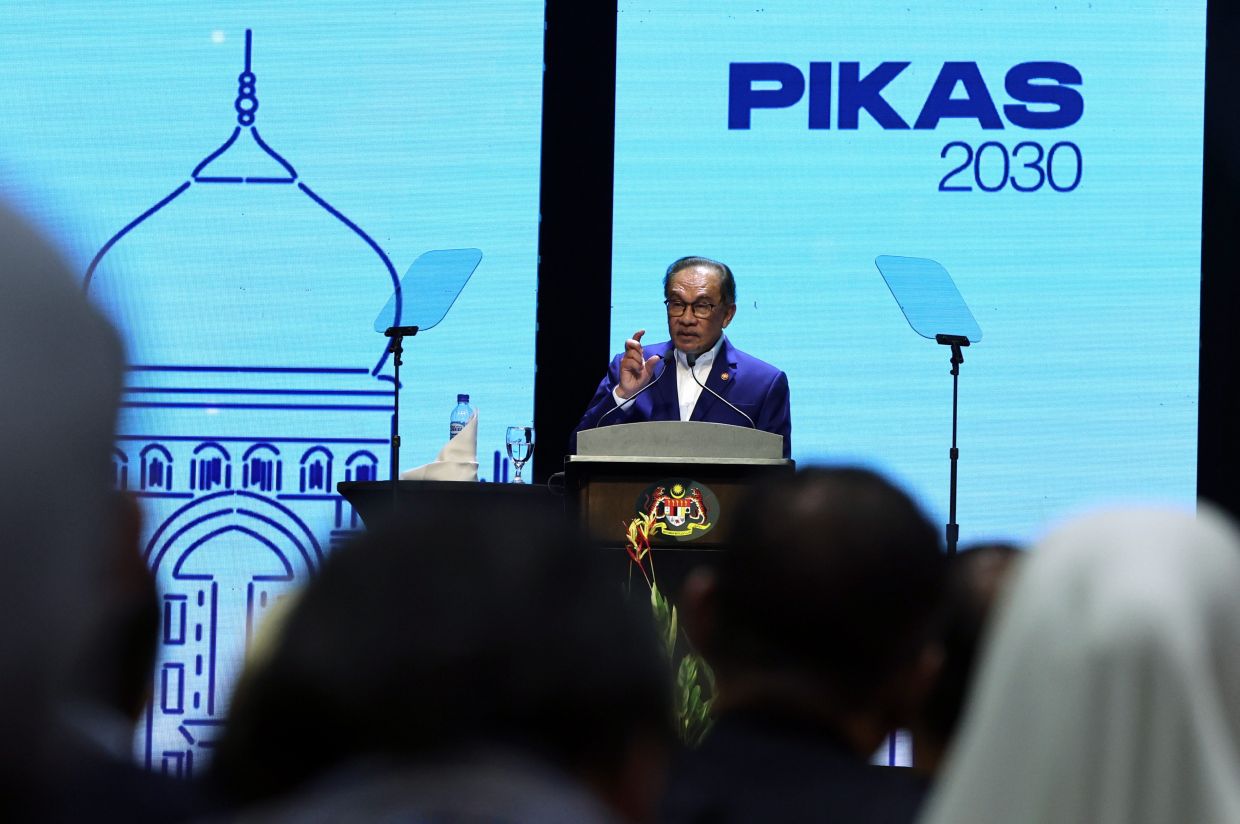CYBERJAYA: The newly unveiled Public-Private Partnership Master Plan 2030 (Pikas 2030) is aimed at strengthening Malaysia’s economic development and governance, says Datuk Seri Anwar Ibrahim.
The Prime Minister said Pikas 2030 is an integrated initiative to bolster the framework for public-private partnerships (PPP), promoting efficient project management and governance to accelerate the nation’s economic growth.
This strategic plan, he said, lays the groundwork for a sustainable PPP landscape, designed to address fiscal challenges while driving national prosperity.
In his keynote speech, Anwar highlighted the role of PPP in reducing government financial burdens.
“Public-private partnerships are not new in Malaysia. Since the 1980s, we have seen this model contribute significantly to our development.
“By collaborating with the private sector, we can build crucial infrastructure while conserving government resources for other pressing needs,” he said when launching Pikas 2030 at Multimedia University, here on Monday (Sept 9).
Anwar explained that the plan sets ambitious targets, with an expected RM78bil increase in private investment, RM82bil contribution to the nation’s Gross Domestic Product (GDP) and the creation of 900,000 jobs by 2030.
To ensure these goals are met, Pikas 2030 is built on four strategic pillars, encompassing 17 initiatives aimed at fostering innovation, competition and quality service.
One of the notable changes introduced under PIKAS 2030 is the shift towards a competitive bidding process for PPP projects through Requests for Proposals (RFP).
Anwar stressed that this move is part of the government’s ongoing commitment to good governance, ensuring that projects are awarded transparently and based on merit.
“This approach enhances competition, drives innovation and ensures the government and the people receive the best possible value.”
Several new PPP models, such as Redevelop/Regenerate-Operate-Transfer (ROT) and Build-Redevelop/Regenerate-Operate-Transfer (BROT), will be introduced under the plan, he said.
These are designed to reduce the financial strain on the government while providing modern infrastructure to benefit the public.
Anwar also emphasised that the government will explore alternative funding mechanisms like Business Trusts and Real Estate Investment Trusts (REITs) to support PPP projects.
“By tapping into private sector capital and expertise, we can accelerate the completion of infrastructure projects with better quality, benefitting both the public and the economy.
“Since 2009, PPP projects have contributed RM50.5bil to the GDP and created over 696,000 jobs.
“This strategy is crucial for advancing the country and improving the people’s standard of living,” he said.
A central theme of Pikas 2030 is its focus on good governance, which Anwar said is essential for the success of any PPP project.
“The success of a PPP hinges on good governance. We must ensure that these projects are free from corruption and are managed with the highest standards of administration,” he added.
He also announced that the government will prioritise PPP projects with user-pays or hybrid-pays models to reduce fiscal pressures.
These models ensure that private companies bear the construction costs, which are then recovered through user charges.
Anwar said that while these models work well for many projects, not all should place financial burdens on the public.
“Some projects are essential and should be funded directly by the government to ensure all citizens can access them without additional costs.”
To safeguard public interest, the Prime Minister said every PPP project will undergo rigorous scrutiny by the Public-Private Cooperation Committee, involving key government agencies.
At the same time, Anwar also highlighted the importance of ensuring financial, legal, technical and socio-economic aspects are thoroughly evaluated before any project is finalised.
Looking ahead, Anwar expressed confidence in the private sector’s role as a strategic partner in driving the nation’s development.
He urged private corporations to be bold and innovative, expanding beyond traditional sectors like construction and transportation.
“We need new ideas, especially in emerging industries like artificial intelligence (AI), where PPP can unlock significant potential for our economy,” he said.
Anwar also hinted at future reforms to enhance PPP governance, including the possible corporatisation of the Public-Private Cooperation Unit and the introduction of legislation to formalise PPP governance structures.
“We must adopt a ‘Whole-of-Nation’ approach. The government needs the private sector, and the private sector needs the government.
“Together, we can build a progressive nation that benefits all,” Anwar said.
With this launch, the government is signaling its determination to not only strengthen Malaysia’s economy but also ensure that growth is inclusive, transparent and governed by principles of accountability.
Anwar said Pikas 2030 sets the stage for Malaysia’s next chapter of development, driven by a partnership between the government and private enterprises that puts the nation’s needs at the forefront.






